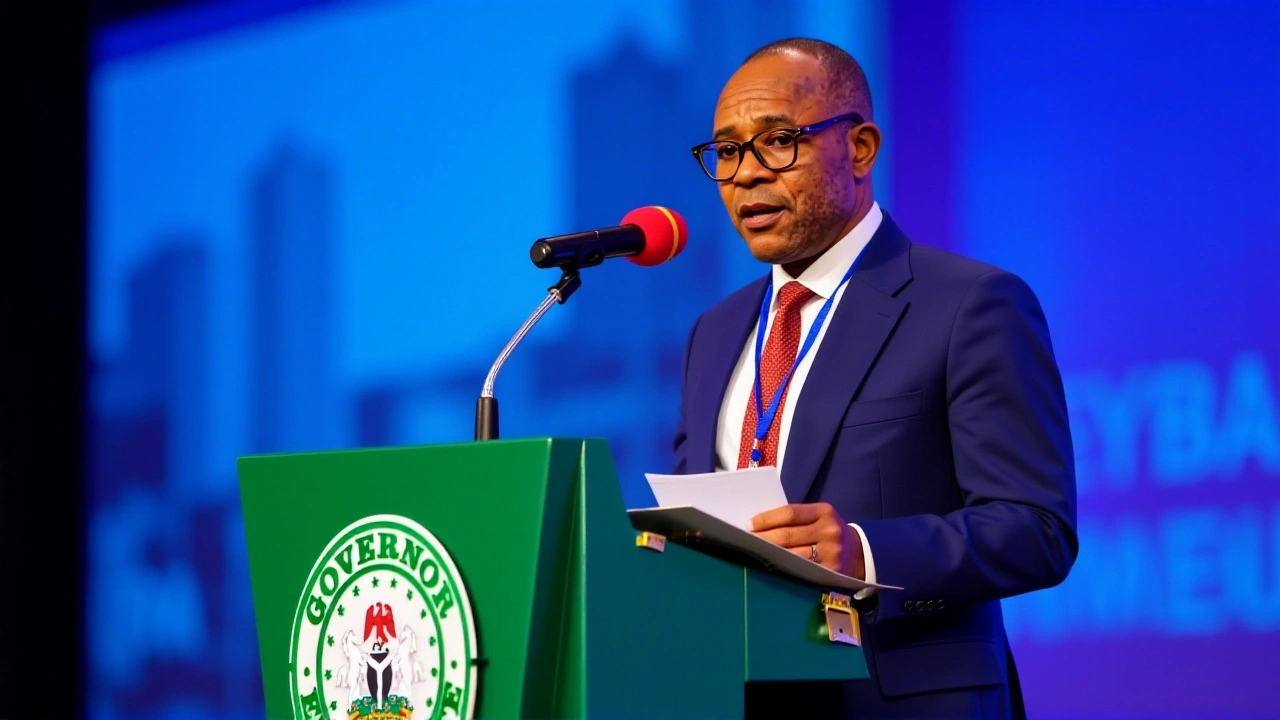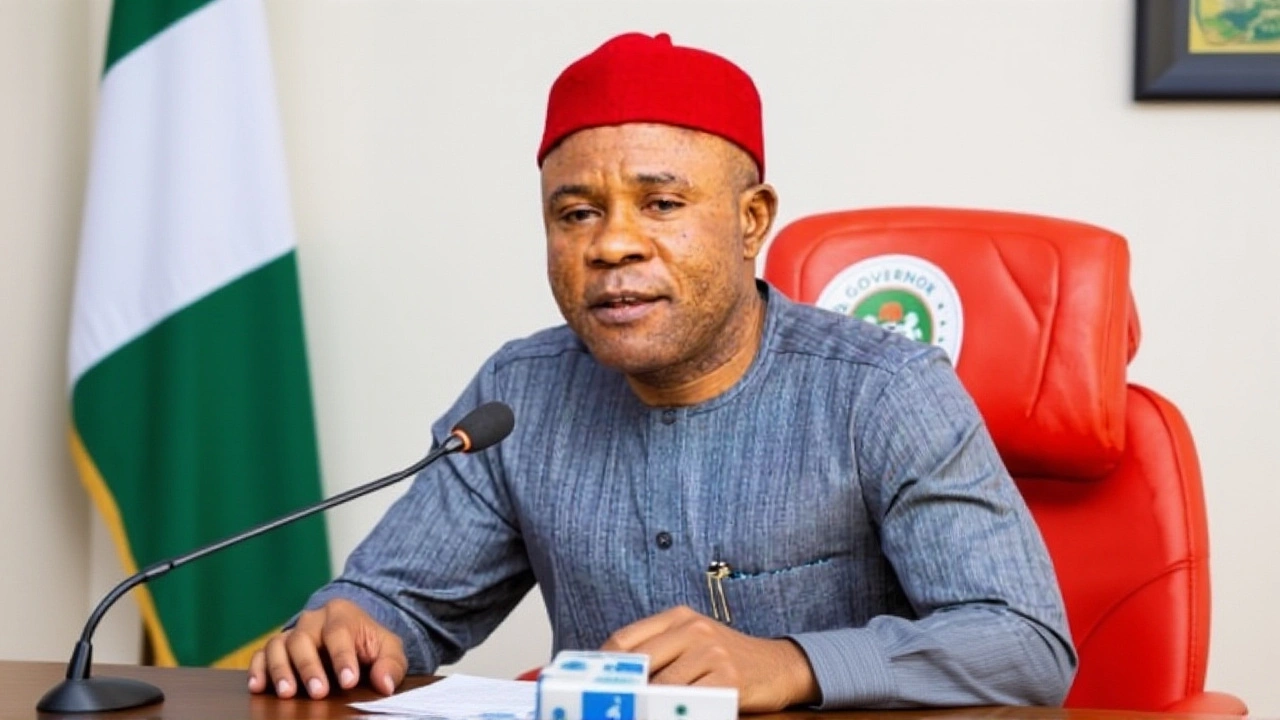On Tuesday, October 14, 2025, Peter Gregory Mbah, Governor of Enugu State, 52, announced his switch from the Peoples Democratic Party (PDP) to the All Progressives Congress (APC) during a televised defection press conference held at Government House, Enugu, Nigeria.
Standing beside him was former governor Ifeanyi Ndagwuiyi Ugwuanyi, 58, who served two terms from 2015 to 2023, as well as APC National Chairman Abdullahi Umar Ganduje. The gathering also featured South‑East APC heavyweights like former Imo governor Rochas Okorocha and a clutch of state legislators. Mbah’s declaration comes just ten days before the October 24 deadline set by Section 87 of Nigeria’s Electoral Act, a deadline that could reshape the 2027 electoral map.
Historical Context: A PDP Stronghold in the South‑East
Since the return to civilian rule in 1999, the South‑East has been a reliable PDP voting bloc, delivering over 90 % of its votes in every presidential election. Yet, the region has often complained of being sidelined in federal appointments and infrastructure spending. Between 2015 and 2023, only 12.3 % of federal road projects were allocated to the Southeast, despite the region contributing roughly 18.7 % of Nigeria’s GDP. No Southeast politician held a key cabinet post during the PDP’s 1999‑2015 administration.
Enugu, in particular, has never voted an APC governor since the Fourth Republic’s inception. In the 2023 gubernatorial race, Mbah won by a razor‑thin margin of 287,432 votes (52.1 % of the total), the narrowest ever in the state’s history, reflecting growing APC momentum.
Details of the Defection: What Happened at the Conference
The press conference began at exactly 2:00 PM WAT, with Mbah stating, “Today we have made the decision to leave the Peoples Democratic Party and join the All Progressives Congress.” He framed the move as a "desire to better serve the people of Enugu and align with the APC’s vision for development and progress."
During the broadcast, Mbah listed a litany of grievances: the region’s 12.3 % share of federal road contracts, the absence of Southeast appointees in key ministries, and the lack of federal approval for the $300 million Akanu Ibiam International Airport expansion. He promised that, under the APC, the Enugu Urban Renewal Programme would accelerate by 40 % and that the 240 MW Oji River Power Plant rehabilitation would wrap up within 18 months.
Ganduje handed out APC membership cards to Mbah, Ugwuanyi, and 37 other defectors, including Enugu North Senator Gilbert Nnaji and House of Representatives member Harcourt Mbah. The former PDP state chairman, Sunday Onyebuchi, was conspicuously absent.
Reactions and Perspectives: From the PDP to Civil Society
The PDP’s national leadership released a terse statement calling the defection “a betrayal of the electorate’s mandate,” while the Enugu State PDP chair, Sunday Onyebuchi, declined to comment, citing the need for “internal party deliberations.”
Opposition lawmakers expressed alarm, warning that the move could trigger a domino effect across the South‑East. Former senator and political analyst Dr. Chinyere Okafor noted, “Mbah’s switch is symbolic; if the APC can convince a sitting governor that the party will finally deliver for the region, we may see a wave of similar defections.”
Grassroots reactions were mixed. In the city’s bustling markets, some traders welcomed the prospect of faster infrastructure projects, while youth activists warned that “changing parties won’t fix the deeper issues of unemployment and marginalisation unless concrete policies follow.”

Impact and Analysis: What This Means for Enugu and National Politics
Politically, the defection gives the APC a foothold in a region it has never ruled. If the promised 30 % federal budget allocation for Southeast industrialisation materialises, it could reshape federal‑state dynamics. Economically, the immediate focus will be on the Akanu Ibiam Airport expansion, a project slated to boost tourism and trade.
Strategically, the move positions the APC to claim a broader national coalition ahead of the 2027 elections. By courting the South‑East, the party hopes to erode the PDP’s historical vote bank and present itself as a truly national platform. However, critics argue that the timing—just days before the legal deadline for party switches—suggests a purely tactical calculation rather than an ideological shift.
- Key demand: 30 % of the federal budget directed to Southeast industrialisation by 2026.
- Targeted projects: Completion of the Oji River Power Plant and the $300 million airport upgrade.
- Political goal: Secure at least 40 % of the Southeast’s presidential vote in 2027.
- Social promise: Create 50,000 youth jobs via the Creative Industry Development Initiative by 2027.
Future Outlook: Rallies, Roadmaps, and the Road to 2027
The next major event is a mega‑rally slated for October 20, 2025, at Nnamdi Azikiwe Stadium in Enugu City. Mbah will unveil a joint Southeast APC roadmap, which is expected to outline the 30 % budget demand, infrastructure timelines, and a youth‑employment agenda.
Legal experts caution that the defection could be challenged in court if any procedural irregularities are uncovered, though past precedents suggest such suits rarely stall political momentum. Meanwhile, the APC is gearing up for a massive recruitment drive, hoping to flip more legislators before the 2027 general elections.
Whether Mbah’s move will translate into tangible development or simply reshuffle political loyalties remains to be seen. What is clear, however, is that the South‑East’s political calculus has irrevocably changed, and the nation’s eyes will be glued to Enugu in the months ahead.
Frequently Asked Questions
How does Mbah’s defection affect everyday residents of Enugu?
If the APC delivers on its promises, residents could see faster road repairs, a fully functional airport, and new power supply from the Oji River plant. In the short term, however, many anticipate disruptions as state agencies realign with federal ministries under the new party umbrella.
What motivated Governor Mbah to leave the PDP after only two years?
Mbah cited long‑standing marginalisation of the South‑East—especially the meagre share of federal projects and the absence of senior appointments. He argued that the APC’s national platform offers better access to federal resources, a claim backed by recent meetings with APC chair Ganduje.
What are the APC’s specific goals for the Southeast after the defection?
The party aims to secure a 30 % slice of the federal budget for Southeast industrialisation, fast‑track the $300 million airport expansion, finish the 240 MW Oji River power plant within 18 months, and create 50,000 jobs through its Creative Industry Development Initiative by 2027.
When are the next major elections, and how could this shift influence them?
Nigeria’s general elections are scheduled for February 2027. By consolidating a Southeast bloc under the APC, the party hopes to erode the PDP’s traditional 90 %+ vote share, potentially making the presidential race far more competitive.
Which other politicians might follow Mbah’s lead?
Analysts point to several high‑profile PDP senators from Abia and Anambra who have hinted at dissatisfaction with Lagos‑based leadership. If the Enugu rally showcases tangible benefits, we could see a cascade of defections across the three South‑East states ahead of the 2027 elections.

14 Comments
Krishna A
October 15 2025
This is just politics as usual-people switch parties like socks.
Jaya Savannah
October 17 2025
So… the governor left PDP for APC… and now we all get free wifi and chicken pepper soup? 😅
रमेश कुमार सिंह
October 17 2025
Imagine the South-East as a long-suffering poet who finally found a publisher who actually reads their verses. Mbah didn’t just defect-he gave voice to a silenced stanza. The airport, the power plant, the 50K jobs-they’re not promises, they’re stanzas waiting to be sung. And if the APC delivers? We might finally hear the full symphony of the Southeast’s potential.
kunal duggal
October 17 2025
The strategic calculus here is non-trivial: by securing the defection of a sitting governor in a historically PDP-aligned state, the APC has effectively breached the political hegemony of the Southeast, thereby altering the electoral elasticity of the 2027 presidential contest. The institutional capture of state machinery under a new party banner, coupled with the promise of federal budget reallocation, represents a structural realignment rather than a mere tactical maneuver.
Divya Johari
October 18 2025
How can anyone take this seriously? A governor switches parties days before a legal deadline, makes grandiose claims with no legislative backing, and expects applause? This is performative politics at its most cynical. No substance. Just spectacle.
Prince Chukwu
October 19 2025
Bro, this ain’t just politics-it’s a cultural earthquake. The Southeast has been waiting decades for someone to say, ‘We matter.’ Now the airport’s getting fixed, the power plant’s coming alive, and the youth are getting jobs? That’s not a defection-that’s a resurrection. I’m crying in my suya stall right now 🇳🇬🔥
Vikas Yadav
October 21 2025
It’s interesting to note that the timing, while legally permissible, does raise questions about motive-but also, let’s be honest, if the APC can deliver on even half of these promises, then maybe, just maybe, this isn’t just political theater.
Amar Yasser
October 23 2025
Man, I’m tired of the same old party games. If this means better roads and actual electricity, I’m all in. No more waiting for promises that vanish like smoke. Let’s see the money move.
Unnati Chaudhary
October 23 2025
It’s funny how the same people who screamed ‘corruption!’ when PDP was in charge are now clapping for APC with the same empty promises. But… maybe this time it’s different? I want to believe. I really do.
Sandhya Agrawal
October 24 2025
Did you see how Ganduje was there? That man’s got a spiderweb of deals stitched into his suit. This isn’t about development-it’s about control. They’ll take the votes, then vanish. Mark my words: the airport will be delayed, the jobs won’t materialize, and the real beneficiaries will be the contractors with ties to Abuja.
Ankush Gawale
October 25 2025
Maybe we’re all too quick to judge. What if this is the moment the Southeast finally gets a seat at the table? I don’t care who’s in charge-I care about the roads, the power, the jobs. Let’s give it a chance, quietly, without the noise.
Steven Gill
October 26 2025
There’s something deeper here-this isn’t just about parties. It’s about dignity. For decades, the Southeast was treated like a province, not a region with history, talent, and hunger for progress. Mbah didn’t just change parties-he changed the narrative. Even if it’s messy, even if it’s late… this is the beginning of a reckoning.
Aniket sharma
October 27 2025
Let’s not forget the people who made this possible-the teachers, the drivers, the market women, the students who stayed up late studying. They didn’t defect. They just kept showing up. This win? It belongs to them. Not the politicians.
Saurabh Shrivastav
October 28 2025
Oh wow, a governor switches parties and suddenly it’s ‘the dawn of a new era’? Next thing you know, they’ll say the moon is made of yam flour. This is the same old script-different costumes, same circus. I’ll believe it when I see the first pothole filled without a protest.